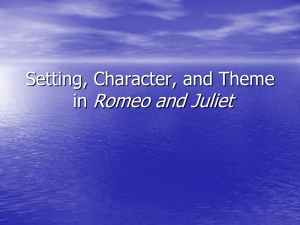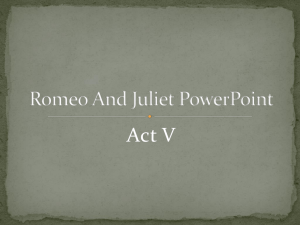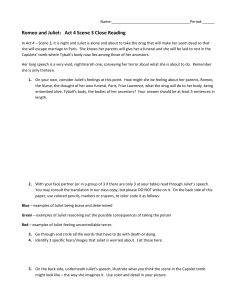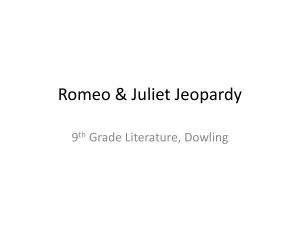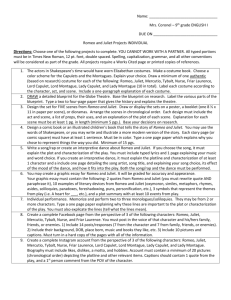Romeo and Juliet: Act 3 & 5 Analysis Worksheet
advertisement
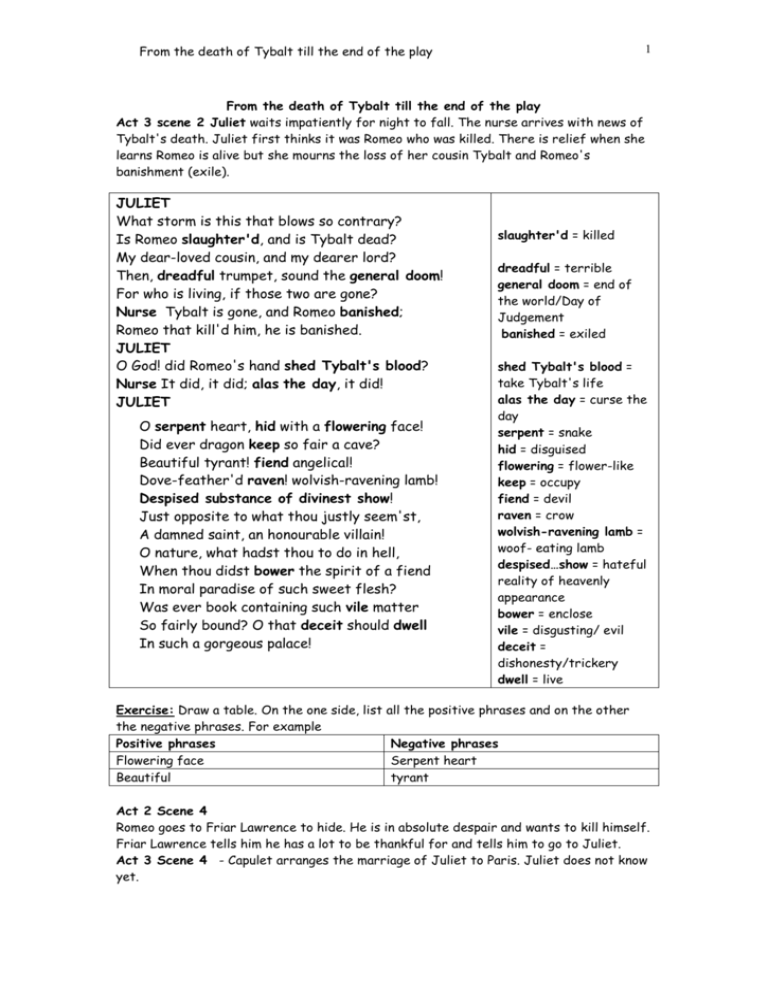
From the death of Tybalt till the end of the play 1 From the death of Tybalt till the end of the play Act 3 scene 2 Juliet waits impatiently for night to fall. The nurse arrives with news of Tybalt's death. Juliet first thinks it was Romeo who was killed. There is relief when she learns Romeo is alive but she mourns the loss of her cousin Tybalt and Romeo's banishment (exile). JULIET What storm is this that blows so contrary? Is Romeo slaughter'd, and is Tybalt dead? My dear-loved cousin, and my dearer lord? Then, dreadful trumpet, sound the general doom! For who is living, if those two are gone? Nurse Tybalt is gone, and Romeo banished; Romeo that kill'd him, he is banished. JULIET O God! did Romeo's hand shed Tybalt's blood? Nurse It did, it did; alas the day, it did! JULIET O serpent heart, hid with a flowering face! Did ever dragon keep so fair a cave? Beautiful tyrant! fiend angelical! Dove-feather'd raven! wolvish-ravening lamb! Despised substance of divinest show! Just opposite to what thou justly seem'st, A damned saint, an honourable villain! O nature, what hadst thou to do in hell, When thou didst bower the spirit of a fiend In moral paradise of such sweet flesh? Was ever book containing such vile matter So fairly bound? O that deceit should dwell In such a gorgeous palace! Exercise: Draw a table. On the one side, list the negative phrases. For example Positive phrases Flowering face Beautiful slaughter'd = killed dreadful = terrible general doom = end of the world/Day of Judgement banished = exiled shed Tybalt's blood = take Tybalt's life alas the day = curse the day serpent = snake hid = disguised flowering = flower-like keep = occupy fiend = devil raven = crow wolvish-ravening lamb = woof- eating lamb despised…show = hateful reality of heavenly appearance bower = enclose vile = disgusting/ evil deceit = dishonesty/trickery dwell = live all the positive phrases and on the other Negative phrases Serpent heart tyrant Act 2 Scene 4 Romeo goes to Friar Lawrence to hide. He is in absolute despair and wants to kill himself. Friar Lawrence tells him he has a lot to be thankful for and tells him to go to Juliet. Act 3 Scene 4 - Capulet arranges the marriage of Juliet to Paris. Juliet does not know yet. From the death of Tybalt till the end of the play 2 Act 3 Scene 5 - Romeo has spent the night with Juliet and it is time for him to leave for Mantua. They do not want to part. They do not know when they will see each other again Enter ROMEO and JULIET above, at the window JULIET Wilt thou be gone? it is not yet near day: It was the nightingale, and not the lark, That pierced the fearful hollow of thine ear; Nightly she sings on yon pomegranate-tree: Believe me, love, it was the nightingale. Wilt thou = Do you want nightingale = זמיר lark =עפרוני thine = your yon = yonder= over there pomegranate = רימון ROMEO It was the lark, the herald of the morn, No nightingale: look, love, what envious streaks Do lace the severing clouds in yonder east: Night's candles are burnt out, and jocund day Stands tiptoe on the misty mountain tops. I must be gone and live, or stay and die. JULIET Yon light is not day-light, I know it, I: It is some meteor that the sun exhales, To be to thee this night a torch-bearer, And light thee on thy way to Mantua: Therefore stay yet; thou need'st not to be gone. herald = messenger morn = morning envious = spiteful/unkind streaks = lines of light lace mark with lines severing = parting jocund = happy/cheerful exhales = breathes out bearer = someone who carries something thee = you yet = still/a little need’st not = don’t have to Act 3 Scene 5 Juliets tears are misread by mother and father. Juliet is told of her arranged marriage to Paris. The Capulets expect her to be grateful and happy about her marriage to Paris but she rejects the arrangement. Capulet (her father) threatens her and insults her. JULIET Good father, I beseech you on my knees, Hear me with patience but to speak a word. CAPULET Hang thee, young baggage! Disobedient wretch! I tell thee what: get thee to church o' Thursday, Or never after look me in the face: Speak not, reply not, do not answer me; My fingers itch. Wife, we scarce thought us blest That God had lent us but this only child; Beseech = beg Hang thee = go hang yourself Baggage = good for nothing Wretch = miserable creature o' = on scarce = not long ago blest = blessed lent us = gave us From the death of Tybalt till the end of the play But now I see this one is one too much, And that we have a curse in having her: Out on her, hilding! 3 hilding = worthless girl Discussion: Violence can be verbal as well as physical. Capulet, Juliet’s father, abuses her verbally. What do you think is the most hurtful part of Capulet’s words. Why? Exercise: Juliet’s nurse was watching this scene. Write her own internal monologue (what she is thinking.) Remember that at the end of this she suggests Juliet forget Romeo and that she marry Paris as her father requires. “I think you are happy in this second match, for it excels the first, or if it did not, your first is dead, or ‘twere as good he were as living here and you no se to him.” Juliet goes to Friar for advice. He offers her a potion, which will put her to sleep on her wedding day. She will appear dead and will be placed in the family tomb instead of being married to Paris. Romeo will be informed of the plan and he will come to take her out of the tomb. The message never gets to Romeo. (The messenger is quarantined due to the Black Plague.) Romeo's servant tells him Juliet is dead. Romeo buys poison for himself and rushes off to the tomb. While opening the tomb he encounters Paris. Act 5 Scene 3 ROMEO Thou detestable maw, thou womb of death, Gorged with the dearest morsel of the earth, Thus I enforce thy rotten jaws to open, And, in despite, I'll cram thee with more food! (Opens the tomb) PARIS This is that banish'd haughty Montague, That murder'd my love's cousin, with which grief, It is supposed, the fair creature died; And here is come to do some villanous shame To the dead bodies: I will apprehend him. detestable = מתועב maw = mouth womb = רחם gorged = filled with morsel = piece (of food) enforce = force rotten = רקוב jaws = מלתעות haughty = too proud fair creature = beautiful woman do…shame to = defile apprehend = arrest/stop A fight follows and Romeo and Romeo kills Paris. He enters the tomb and sees Juliet. From the death of Tybalt till the end of the play ROMEO … O my love, my wife, Death that has sucked the honey of thy breath, hath has had no power yet upon thy beauty, Thou art not conquered, beauty's ensign yet Is crimson in thy lips and in thy cheeks, And death's pale flag is not advanced there. … Here, here will I remain With worms that are thy chamber-maids; O, here Will I set up my everlasting rest, And shake the yoke of inauspicious stars From this world-wearied flesh. Eyes, look your last! Arms, take your last embrace! and, lips, O you The doors of breath, seal with a righteous kiss A dateless bargain to engrossing death! Come, bitter conduct, come, unsavoury guide! Thou desperate pilot, now at once run on The dashing rocks thy sea-sick weary bark! Here's to my love! (Drinks) O true apothecary! Thy drugs are quick. Thus with a kiss I die. (Dies) 4 thy = your hath = has conquered = taken by death ensign = flag/ emblem crimson = bright red chamber-maids = nurses everlasting = eternal shake the yoke = get rid of the burden/chains inauspicious = unlucky fate world –wearied flesh = a body, tired of life embrace = hug seal…bargain = finalize the deal engrossing = משיכת מלוא unsavory guide = the poison desperate pilot = the poison at once = immediately Run on = crash/smash/dash Weary bark = tired ship Apothecary = רוקח Romeo dies. Friar Lawrence arrives at the tomb and finds the body of Paris outside, Romeo dead inside and Juliet just waking up from the "death-sleep". He tells her that there has been a terrible mistake and that they must go quickly before they are discovered. Juliet refuses. (Noise again) FRIAR I dare no longer stay. JULIET Go, get thee hence, for I will not away. Exit FRIAR LAURENCE What's here? a cup, closed in my true love's hand? Poison, I see, hath been his timeless end: O churl! drunk all, and left no friendly drop To help me after? I will kiss thy lips; Haply some poison yet doth hang on them, To make die with a restorative. (Kisses him )Thy lips are warm. FIRST WATCHMAN [Within] Lead, boy: which way? JULIET Yea, noise? then I'll be brief. O happy dagger! Get the hence = go Away = leave Churl = brute/ inconsiderate fellow Haply = perhaps Yet doth hang on them = may till be on them Restorative = medicine the kiss with poison will restore her to death and bring her to Romeo Snatching = grabbing Dagger = knife From the death of Tybalt till the end of the play (Snatching ROMEO's dagger) This is thy sheath; (Stabs herself) there rust, and let me die. (Falls on ROMEO's body, and dies) 5 Sheath = נדן Stabs = pushes the knife in Rust = become rusty Juliet stabs herself . Soon the terrible tragedy is discovered. Capulet and Montegue and the Prince are called. The truth becomes clear. The prince delivers the final speech of the tragedy. PRINCE … Where be these enemies? Capulet! Montague! See, what a scourge is laid upon your hate, That heaven finds means to kill your joys with love. And I for winking at your discords too Have lost a brace of kinsmen: all are punish'd. CAPULET O brother Montague, give me thy hand: This is my daughter's jointure, for no more Can I demand. MONTAGUE But I can give thee more: For I will raise her statue in pure gold; That while Verona by that name is known, There shall no figure at such rate be set As that of true and faithful Juliet. CAPULET As rich shall Romeo's by his lady's lie; Poor sacrifices of our enmity! PRINCE A glooming peace this morning with it brings; The sun, for sorrow, will not show his head: Go hence, to have more talk of these sad things; Some shall be pardon'd, and some punished: For never was a story of more woe Than this of Juliet and her Romeo. Exeunt scourge …thy hate = punishment is caused by your hate means = ways I for = because I winking at = ignoring/ turning a blind eye your discords = fighting/feud brace of kinsmen = several relatives jointure = dowry = נדוניה = money paid by the to the bride by the grooms father. raise = build/ construct while = as long as figure = statue such rate = great value poor… emnity = insufficient (not enough of a) price to pay for our feuding glooming = gray/dark sorrow = sadness pardon’d = forgiven woe = sorrow / sadness/tragedy exeunt = all leave That’s it! Enjoy preparing your final project!



